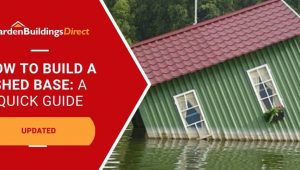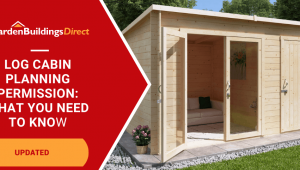Jump to:
When it comes to investing in a new garden shed, durability is a key factor to consider. After all, you want it to withstand the test of time, protecting your tools and belongings for years to come. But the question lingers in terms of the material: What lasts longer, metal or plastic?
In this article, we’ll explore the longevity of these two popular shed types. Join us as we delve into their advantages and the factors that impact their lifespan. By the end, you’ll be better equipped to make an informed choice for your storage needs.
What are Metal Sheds?

Metal sheds are garden structures primarily constructed from steel or aluminium. Steel is heavier and provides exceptional strength – ideal for heavy-duty applications. Aluminium is lighter and offers excellent rust resistance but may be less sturdy. Regardless, their main function is to provide reliable and durable outdoor storage solutions.
Modern units available on the market often boast cutting-edge steel materials. The modern wall panels have been designed with durability and multi-purpose in mind. Each is constructed with two layers of cladding – surrounding a 120mm internal air gap. This allows for natural ventilation, insulation, and electrical wiring installation.
Metal sheds are recognised for their robustness. They offer resistance to moisture, pests, and UV rays. With such qualities, you can ensure your stored items remain secure and protected. Moreover, their excellent structural integrity reduces the risk of warping or damage. But their key advantages don’t stop there!
Advantages of Metal Sheds
Steel sheds offer a range of advantages that make them a compelling investment. So, if you’re in search of a reliable storage shed, consider these enticing qualities:
1. Security
Most metal garden sheds come equipped with sturdy construction and lockable doors. These features provide an added layer of security. They help deter potential break-ins, offering peace of mind for your valuable belongings.
2. Low maintenance
When it comes to maintenance, regular staining or painting is crossed out on the list. Metal sheds demand minimal upkeep due to their resistance to rot, decay, and pests. Unlike their wooden shed counterparts, quick cleaning and occasional protective coating are enough.
Regularly hose down the exterior to remove dirt and debris. Check for any chipped or scratched areas and touch them up right away with rust protector. This will extend the building’s lifespan and keep it looking great for years to come.
3. Fire resistance
Metal sheds are highly fire-resistant due to the non-combustible nature of metal materials. They don’t contribute to the spread of fire and are less vulnerable to ignition than timber models.
This quality is crucial for safety, especially if you store flammable materials. The same goes if you use the shed for hobbies involving fire, such as welding or woodworking. Overall, this perk offers peace of mind and safety for shed owners.
To maximise fire resistance, avoid clutter and flammable materials inside the shed. Install fire-resistant insulation if necessary. Also, ensure the shed is well-ventilated to prevent heat buildup.
4. Weather resistance

Metal sheds exhibit exceptional weather resistance. This makes them a reliable choice for various climates; here’s why:
- Durable materials: Metal can withstand heavy rain, extreme temperatures, and high winds. All this without warping or deteriorating.
- Waterproof construction: Steel sheds are designed with overlapping panels and sealed seams. Such features ensure they remain waterproof, preventing leaks and water damage.
- Snow load tolerance: They are built to handle heavy snow loads. This makes them suitable for regions with snowy winters.
- Resistance to corrosion: The metal is treated with coatings to resist rust. This is essential in moist or coastal environments.
Although this weather resistance is superb, don’t be complacent. Do your part to maintain these qualities. Keep the shed’s roof and seals in good condition. Ensure proper drainage and apply rust-resistant coating as needed.
What Are Plastic Sheds?

Plastic sheds are outdoor storage structures crafted from durable, high-quality plastic materials. These are not the flimsy, single-use plastics that may come to mind. Instead, they are constructed from robust and UV-resistant polymers, often polyethene or PVC. These materials provide the strength needed to withstand the rigours of outdoor use.
Polyethylene, for one, is a tough and UV-resistant plastic. It can endure sunlight exposure and extreme weather conditions without fading or degrading. PVC (polyvinyl chloride) is another common material used in plastic garden sheds. It’s known for its durability and resistance to moisture and corrosion. Both make modern plastic sheds a reliable and attractive option for garden storage.
Advantages of Plastic Sheds
Plastic sheds stand out with a host of remarkable advantages. Even in a market saturated with wooden and metal alternatives, you can’t overlook these perks:
1. Lightweight

Plastic sheds are prized for their lightweight construction, which serves a dual purpose. Their reduced weight significantly eases assembly, making it a more manageable DIY project. Moreover, this attribute allows for flexibility in placement. You can easily reposition or relocate the shed if needed.
The typical weight can vary widely depending on their size and design. As a general guideline, small to medium-sized models weigh from 50 to 150 pounds (23 to 68 kilograms). Larger plastic sheds or those with additional features may weigh more.
Despite their lightweight nature, plastic sheds maintain structural integrity. The materials used are engineered to offer:
- stability
- durability
- resistance to various environmental factors
These ensure they can withstand the rigours of everyday use while being portable.
2. Less demanding

Plastic storage sheds are virtually maintenance-free! Their durable resin construction is resistant to rust, corrosion, and pest infestations. This eliminates the need for protective coatings or regular inspections. Unlike metal sheds requiring rust treatments, plastic sheds remain impervious to such concerns.
This feature results in a hassle-free ownership experience. Meaning it saves you time, effort, and long-term expenses. With one, all that’s required is the occasional cleaning to keep them in pristine condition.
3. Pest resistance
Unlike wood, plastic shed materials are unattractive to termites and other pests. This makes them a reliable choice for safeguarding your items from pest damage. It also eliminates the need for costly pest control measures. Moreover, plastic’s resistance to moisture further enhances its durability.
4. Affordability

The materials used in plastic shed construction are more budget-friendly. This results in a lower initial purchase price, extending beyond the upfront cost. Even better, their low-maintenance nature reduces long-term expenditures. There’s no need for costly rust-resistant coatings or frequent maintenance.
The prices for our plastic sheds for sale range from as low as £130 up to £3,000 for bigger models. There are lots of top-quality options to choose from! Overall, this cost-effectiveness makes plastic sheds a big plus if you’re on a budget!
Which Lasts Longer?
Metal sheds and plastic sheds each offer unique advantages. But when it comes to longevity, the metal material tends to have the upper hand. Metal sheds are prized for their robustness, excellent structural integrity, and fire resistance. They can endure harsh weather conditions and last for decades with proper maintenance.
In contrast, plastic sheds excel in low maintenance, affordability, and pest resistance. However, they may not match the extended lifespan of their metal counterparts.
Plastic sheds are a practical choice for those seeking cost-effective and low-maintenance solutions. Meanwhile, metal sheds are ideal for those prioritising long-term durability and security. Ultimately, the choice between the two depends on your specific needs and budget. You may refer to the advantages that we outlined in this guide once again to make an informed choice.
Round-up
In the quest for the ideal garden storage, the choice between metal and plastic sheds hinges on individual priorities. Metal sheds shine with their longevity, strength, and fire resistance. Meanwhile, plastic sheds offer low-maintenance affordability and pest resistance.
Assess your unique requirements and budget to determine which suits your needs best. But whichever path you choose, both options provide reliable and durable solutions.
Ready to make a purchase but need to know more? Our sheds buying guide has everything you need to consider.
Our garden sheds for sale assure you of excellent value for your money!





